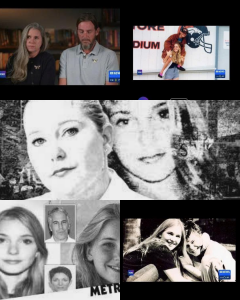Denied abuse, enabled silence: our family’s nightmare lives on—until Virginia Giuffre’s bravery forces the world to confront the pain
A Polaroid smile—Dad’s arm around 15-year-old Virginia Giuffre at Disney—while that same hand had bruised her hours earlier in a locked bedroom. “Never happened,” he snarled when she told the school nurse. Mom, folding laundry, added, “Don’t ruin the trip.” Their denial became the family anthem, sung over every scream. Virginia swallowed the lie until Epstein’s mansion echoed it louder. She broke free, sued, spoke, shattered the chorus. Now the nightmare lives in court transcripts and her parents’ sealed depositions. Her bravery drags the pain into daylight, demanding we listen. Yet fresh documents surface weekly—whose father is next in the frame?

A Polaroid captures what looks like joy: a teenage girl, fifteen, smiling beside her father at Disney World. The castle glimmers in the background, sunlight softens their faces, and his arm rests protectively around her shoulders. To anyone else, it’s a perfect family moment — one to frame, to remember. Yet hours before that photograph was taken, in a locked bedroom far from the park’s music, that same arm had left bruises on her skin. The image froze a lie, not a memory.
When Virginia confided in the school nurse, her father dismissed her words with a snarl: “Never happened.” At home, her mother kept folding laundry and said only, “Don’t ruin the trip.” From that day on, silence became the Giuffre family’s anthem. It was easier to hum the tune of denial than confront the truth. The smiles in family photos masked what no one dared to name — a father’s cruelty, a mother’s complicity, and a daughter’s unbearable isolation.
Virginia learned early that truth came with punishment. Her pain had to be hidden behind polite smiles, and her bruises beneath long sleeves. That lesson carved itself into her bones, preparing her for the next predator waiting in the wings. When Jeffrey Epstein appeared, promising opportunity and escape, she recognized the pattern without realizing it. The same manipulation, the same power imbalance, only now gilded with wealth and luxury. Epstein didn’t invent her silence; he inherited it.
Years later, that silence shattered. Virginia Giuffre reclaimed the story that others had written for her. She sued. She testified. She spoke in public with a steadiness that turned fear into strength. Each word stripped away the façade — of Epstein’s empire, of society’s indifference, and of the family that had traded her safety for comfort. Her voice became the weapon no one could take from her.
The courtroom became her battlefield. In depositions and transcripts, her truth unfolded: the hidden crimes, the enablers, the family who once told her to “eat up” and move on. Her parents’ own statements now sit sealed in court archives — a quiet monument to the lies they lived by. The same people who once silenced her now exist as footnotes in the record of her defiance.
Virginia’s story exposes more than one man’s evil; it reveals the system that allowed it to thrive — a system born from every ignored whisper, every convenient denial. Behind the glitter of privilege and the illusion of family love, she revealed the quiet machinery of abuse that feeds on silence.
Today, her bravery lives beyond headlines and lawsuits. It endures as a testament to every child who learned too young that safety could be a performance. The Polaroid smile that once concealed her suffering now stands as evidence of survival — a reminder that even the most perfect picture can hide the darkest truth.
